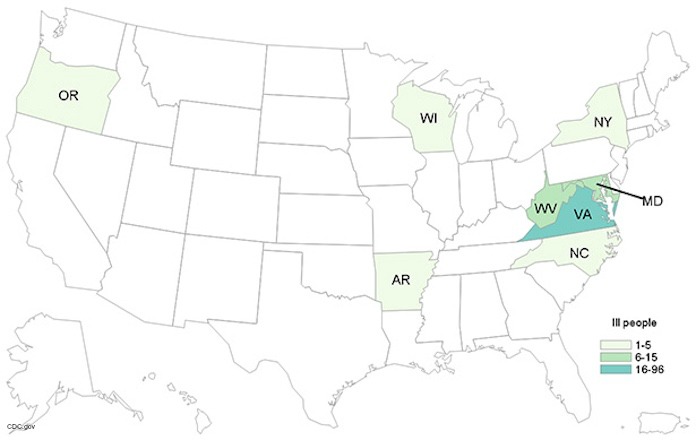The Centers for Disease Control and Prevention (CDC) updated the hepatitis A outbreak linked to frozen strawberries that were served at Tropical Smoothie Cafe locations in several states. Their numbers as of September 14, 2016 are 119.

But Virginia updated their numbers on September 16, 2016 from 94 to 98, which means there are at least 123 people sickened in this outbreak. The case count by state is: Arkansas (1), Maryland (12), New York (3), North Carolina (1), Oregon (1), Virginia (98), West Virginia (6), and Wisconsin (1). Forty-seven ill persons have been hospitalized. No deaths have been reported.
The hospitalization rate in this outbreak is at 39%, which is about double the usual hospitalization rate in a hepatitis A outbreak. There is no explanation for this number. People who usually suffer the most serious complications from hepatitis A are the elderly, those with liver disease, and people with chronic health conditions.
In interviews, almost all of the ill persons reported drinking smoothies containing strawberries at a Tropical Smoothie Cafe location in Maryland, North Carolina, Virginia, and West Virginia before August 8, 2016. On that day the Tropical Smoothie Cafe chain removed the Egyptian frozen strawberries implicated in this outbreak from their restaurants. They switched to another supplier for all of their restaurants nationwide.
There is no indication of an ongoing risk of hepatitis A infection at Tropical Smoothie Cafes, according to the CDC. The government is not aware of any other restaurants that may have received the frozen strawberries imported form Egypt that are linked to this outbreak.
The CDC recommends that you contact your doctor if you think you may have become ill from eating a smoothie containing strawberries from a Tropical Smoothie Location before August 8, 2016 in the states mentioned above. They also say that it is important that food handlers and restaurant employees contact their doctor and stay home if they have a hepatitis A infection.
Symptoms of hepatitis A include yellow eyes and skin (jaundice), abdominal pain, fever, nausea, vomiting, loss of appetite, weight loss, clay colored pale stools, and dark urine. Not everyone who is infected with this virus will experience symptoms. Some people only have a mild flu-like illness.
But since people with the virus are contagious for two weeks before symptoms appear, they will go to work or school and can easily spread the illness. Hepatitis A is spread through the fecal-oral route, which means it is crucial that everyone always wash their hands after using the bathroom and before preparing or serving food or drink to others.
To wash your hands correctly, add a good amount of soap to one palm and rub your hands together under warm running water. Continue to rub your hands for 20 seconds, making sure you wash between the fingers, under the nails, and the backs of your hands. Rinse well and dry vigorously with a clean towel.
Hepatitis A illnesses have declined dramatically over the last 10 years because of vaccination programs. Once a person gets this illness, it is easily transmitted to others, especially those in the same household. The hepatitis A is recommended as part of routine vaccinations in childhood and for adults at high risk for complications.




